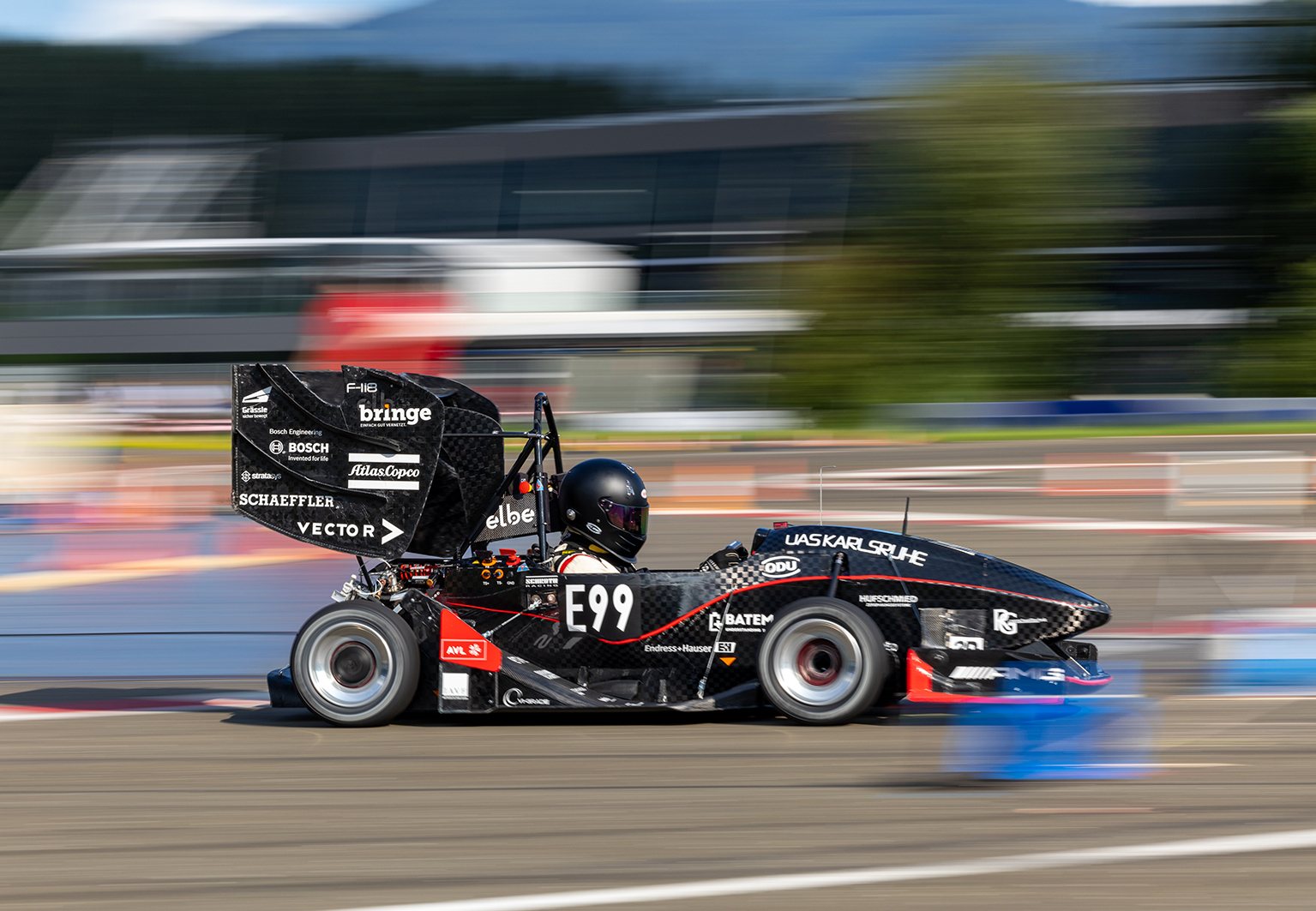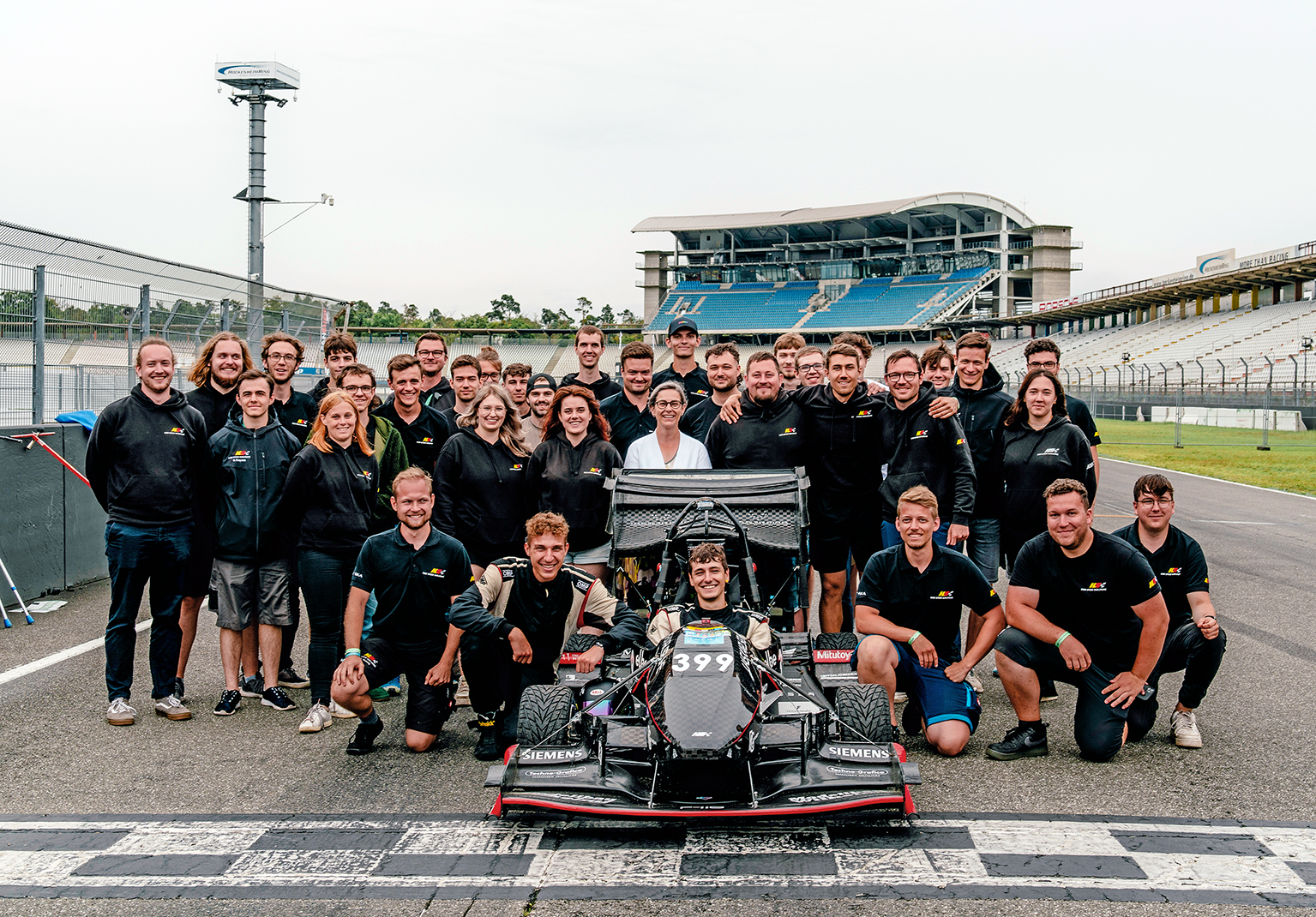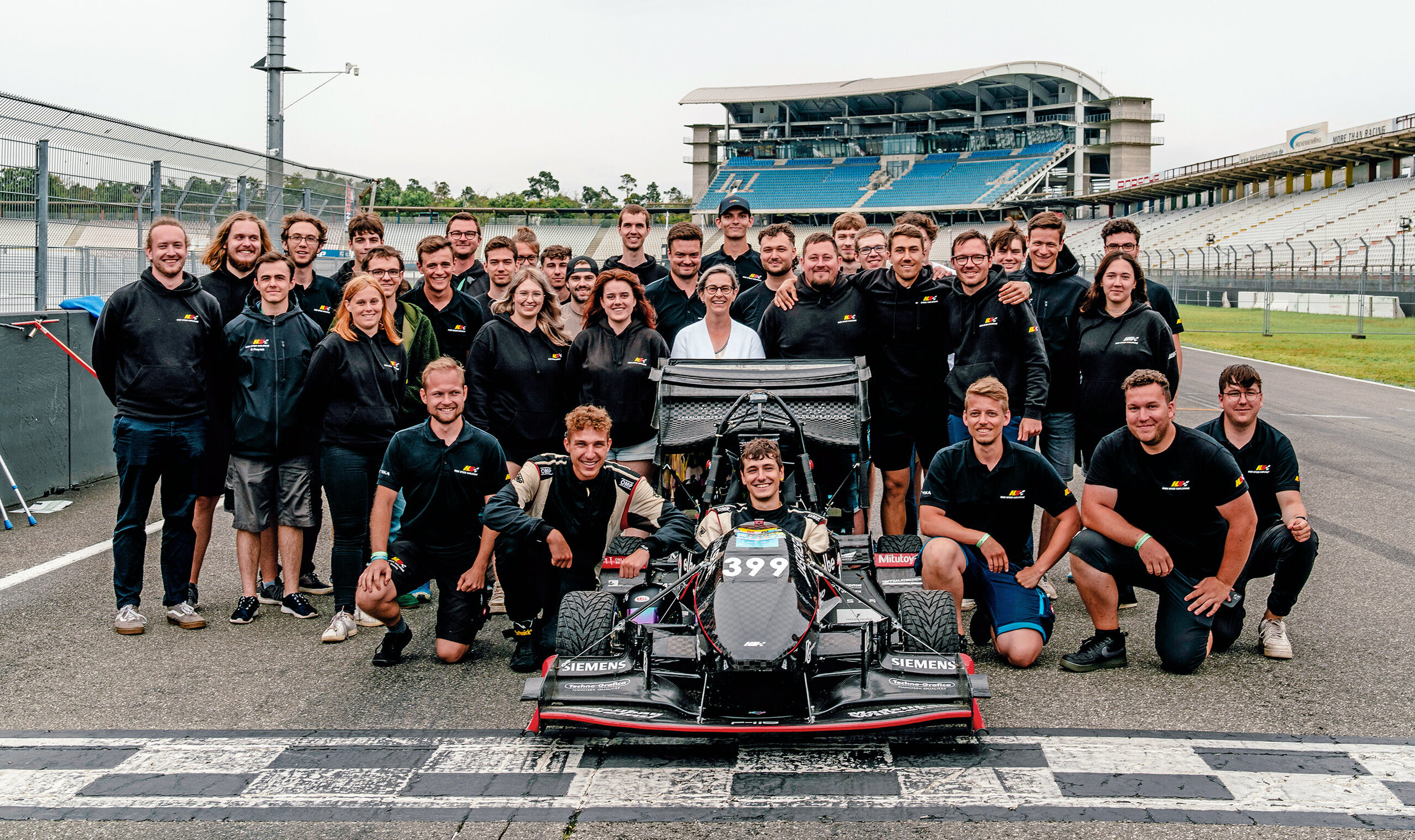September 26, 2024
High Speed Karlsruhe, the Formula Student team at Karlsruhe University of Applied Sciences (HKA), has dedicated the past nine months to developing, designing, and building this year’s racing car, the F-118. For the first time since 2011, they entered the Formula Student competitions against student teams from other universities with a fully electric racing car. Just a few weeks ago, the 50 participating students from the various study programs Automotive Engineering, Mechanical Engineering, Mechatronics, Electrical Engineering & Information Technology, Business Administration & Engineering , as well as Computer Science and Computer Science & Media were able to present their racing car to the public.
This year, the team's focus was on developing a fully electric drivetrain, building on their previous success with a hybrid drive in last year’s competition. They were tasked with designing and manufacturing several key components from scratch, including the battery, gearbox, and the integration of the electric motors with all necessary control units.
Additionally, the team managed to further optimize the suspension, chassis (full carbon monocoque) and aero package, consisting of front and rear wing and underbody.
After this semester’s exams and a brief testing phase, the time had finally come for the car to hit the track.
Competitions in Austria and Hungary
From July 21 to 25, the team competed at the Spielbergring (Austria), where their car underwent a rigorous technical inspection, which it successfully passed after some adjustments. This was a significant achievement, as safety regulations for electric vehicles with high-voltage batteries differ from those for combustion engine vehicles. In the static disciplines, the HKA team demonstrated their thorough preparation, securing first place in the Cost Report and fifth place in the Business Plan Presentation. While the results in the dynamic disciplines, as was to be expected, did not match those in the static categories, solid performances in the midfield ultimately contributed to a commendable 12th place in the overall ranking.
Immediately after, the race moved to the Zalazone test track in Hungary from July 28 to August 3, where the team again passed the technical acceptance tests with flying colors. Following strong performances in the static disciplines, they also achieved good results in all dynamic disciplines. A 6th place in Engineering Design confirmed the team's very good engineering performance. However, similar to the contest in Austria, the Endurance race in Hungary could not be completed. Despite this, the team achieved 12th place in the overall classification.
Season finale in Germany
One week later, the final race scheduled took place at Hockenheim (Germany), featuring a total of 79 teams in the world’s largest electric competition. The large starting field included all the top teams, making the static competitions particularly challenging. Nevertheless, the HKA team rose to the occasion, successfully achieving an 8th place and two 10th place finishes. Unfortunately, problems with the interpretation of the extensive regulations meant that the team was unable to take part in the Acceleration and Skid Pad races. However, after failing in the first two competitions, the HKA team successfully completed the Endurance race in 17th place - a notable achievement given that only 24 vehicles made it to the finish line over the full distance of around 22 kilometers. “This was an extraordinary achievement for us in our first season with a newly developed electric vehicle,” says team captain Maximilian Born, a 5th-semester Business Administration & Engineering student. “This success was made possible by the teams supporting each other throughout the competitions.” Overall, the points earned secured them 13th place, highlighted by a victory in the Efficiency category: without any special measures having been taken, the car nonetheless consumed just 3.391 kWh during the Endurance event, demonstrating the lowest electrical energy usage.
President Prof. Dr. Rose Marie Beck expressed her delight: “High Speed Karlsruhe is the most extensive and significant student project at HKA. This achievement bears testimony to the incredible teamwork involved. High Speed Karlsruhe successfully developed and built a fully electric racing car on their first attempt, demonstrating its competitive edge even in the demanding endurance races. This accomplishment showcases the effective blend of motivation, specialized knowledge, practical skills, and the collaborative spirit needed to achieve a common goal. We are immensely proud of our students; they truly deserve the highest recognition.”
60 sponsors fund the project
There is no other project that allows students to apply the fundamentals learned in lectures and exercises as comprehensively and deeply as the Formula Student project. All the necessary steps are organized by the students themselves, right up to the highly complex production of the individual parts. They receive valuable support from numerous sponsors as well as the University's own workshop at the Faculty of Mechanical Engineering & Mechatronics and the Institute of Materials & Processes, where most of the required components are produced. Notable companies such as Schaeffler, Siemens, Vector Informatik, Mercedes-AMG, and Bringe Informationstechnik are among the approximately 60 sponsors supporting High Speed this season. “They also provide mental support and keep in touch with us,” explains Team Captain Maximilian Born. “Anyone who has been involved for almost a year or even several years not only enjoys a remarkable experience and gains substantial hands-on knowledge but also receives a golden ticket for their future career.” The next season is set to begin in September 2024 when the new team is put together at the start of the winter semester.
Challenging design competition
The main task of the international Formula Student design competitions is to produce a racing car that would be suitable for small-scale production. However, speed is only one aspect; the overall concept is evaluated, which also includes acceleration and braking performance as well as design, weight and calculated production costs. In order to develop a fast, agile, safe, economical and reliable racing car that is also cost-effective, the students need to plan and coordinate the project in detail, including a marketing strategy, business plan and cost report. This requires many engineering-specific skills, as well as extensive business and marketing skills. The idea behind this competition is to give students an attractive opportunity to put the knowledge they have acquired during their studies into practice.



